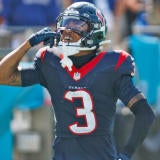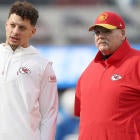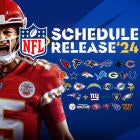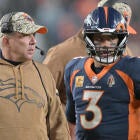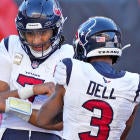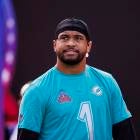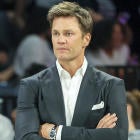When you finish a season with a 2-14 record, chances are you're pretty bad on both sides of the ball. A team has only finished with two wins or fewer 20 times since the league expanded to 32 teams back in 2002, putting any 2-14 squad squarely inside the bottom four percent of teams that have competed in this era. It should come as no surprise, then, that the 2-14 2016 San Francisco 49ers were dreadful on both offense and defense.
Chip Kelly's crew was quite miserable offensively, finishing 31st in yards gained, 27th in points scored, and 23rd in Football Outsiders' offensive DVOA (Defense-adjusted Value Over Average, which adjusts performance for down, distance, and opponent). But they were even worse on the other side of the football, where they finished the year dead last in both yards and points allowed, and 28th in defensive DVOA. And that defensive ineptitude was not limited to any one area of the game, either. The 49ers finished the year 28th in passing yards allowed per attempt, 27th in opponent's passer rating, 28th in pass defense DVOA, 32nd in rush yards allowed per attempt and per game, and 31st in rush defense DVOA.
(The 49ers are back at training camp! Don't MISS anything as they prepare to try and make the playoffs -- take five seconds to Sign up for our Free 49ers newsletter now!)
They were bad against passes to the left (21st in DVOA), right (30th) and middle of the field (20th); against passes to No. 1 wideouts (31st), No. 2 wideouts (24th), tight ends (27th), and running backs out of the backfield (27th). They were 20th in Football Outsiders' Adjusted Sack Rate and 29th in Adjusted Line Yards (which assigns credit to the offensive or defensive line based on a percentage of rushing yards gained). They allowed conversions in 71 percent of power situations (third or fourth down with two or fewer yards to go, plus all goal-to-go situations inside the 2-yard line), which ranked 28th in the NFL. They stuffed only 16 percent of opponent rushing attempts in the backfield, which ranked 26th in the NFL.
In other words, they were really, really bad at literally everything. Which means next year, there's nowhere to go but up. And the thing is, they actually have a decent chance to show real improvement.
Let the turnaround begin
The 49ers have a new coach in Kyle Shanahan and a new defensive coordinator in Robert Saleh, who is coming over from the Jacksonville Jaguars. Saleh followed former Jaguars coach Gus Bradley from the Seahawks to the Jaguars, getting a promotion from quality control coach in Seattle to linebackers coach in Jacksonville. Now he's taking the next step to calling his own defense.
Saleh's actually got a decent batch of talent to work with in San Fran, too, especially along the defensive front. (Even though the Legion of Boom has defined the personality of that Seattle defense for years, the true strength of the defense has always started with the front seven.) Transitioning from a 3-4 defense to a Seahawks-style 4-3 should prove beneficial for several players among that group, as they'll now be freed to play more aggressively by attacking through the gap in front of them rather than being asked to merely occupy blockers.
The 49ers have used three consecutive first-round picks on defensive linemen. They snagged Arik Armstead with the No. 17 pick back in 2015 before, took DeForest Buckner at No. 7 in 2016 and traded down one slot to pick up Solomon Thomas at No. 3 this year. All three players should start on San Francisco's defensive line -- Thomas and Armstead on the edge and Buckner on the interior.
Thomas would have been easily considered the best defensive player in the 2017 draft if not for the existence of Myles Garrett. He's a destructive two-way force equally capable of wreaking havoc in the backfield against both the run and the pass. (He recorded 14 tackles for loss and 8.5 sacks last season.) He's also an athletic freak that ranked sixth among edge rushers in the SPARQ athleticism metric with a grade that puts him in the 94th percentile among NFL defensive ends. He's uniquely equipped to have success right away at a position where players tend to take a while before they break through.
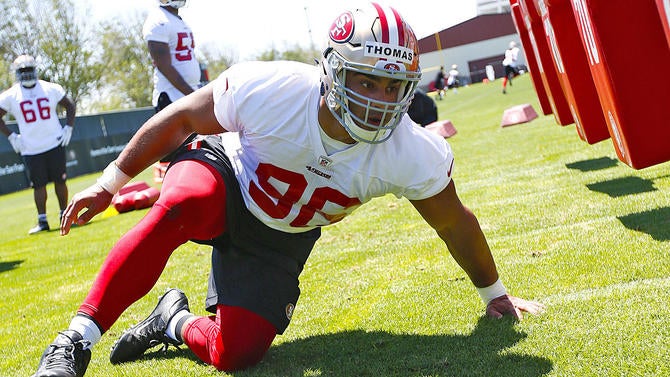
Armstead is coming off two solid but unspectacular seasons, but he's transitioning to a new role that will see him shift outside. He played on the interior as a hybrid player during his first two seasons, picking up 4.5 sacks and 62 pressures in 24 games. It's a bit different trying to challenge tackles one-on-one than it is attempting to penetrate the A or B gap, but Armstead has the size and athleticism to make the move successfully.
Aaron Lynch will also make a transition, though his is a bit different than Armstead's. He'll move from being a 3-4 outside linebacker to working as a 4-3 end, which means he'll be free to go full-bore rushing the passer far more often than he was before. Lynch is coming off a season where he had only 1.5 sacks in seven games, but he was very productive in a part-time role (12.5 sacks, 102 pressures) during his first two years in the league. Lynch, Ahmad Brooks, and Elvis Dumervil have more experience than either of the young guns, but they all seem likely to be used in situational roles rather than being given a heavy complement of snaps. Still, they should help the 49ers generate more pressure than a year ago.
Buckner's coming off an excellent rookie campaign during which he recorded 73 combined tackles, six sacks, 48 pressures, and 27 run stops. The latter two figures ranked fourth among all 3-4 defensive ends, per Pro Football Focus. He'll play up the middle with free-agent signing Earl Mitchell (looking for a rebirth after three meh seasons with the Dolphins) and Quinton Dial.
There's plenty of talent at the linebacker level as well. Na'Vorro Bowman is still capable of reaching extremely high levels of play. Eli Harold is a solid contributor. And 2017 first-rounder Reuben Foster was considered the best second-level defender in this year's class, but he fell to No. 31 because of concerns about his shoulder (he had surgery) and his exploits at the NFL Combine, where he submitted a diluted urine sample and got into a heater argument with one of the hospital workers conducting medical evaluations. He should play a significant role now that Malcolm Smith, the former Super Bowl MVP and a key free-agent signing this offseason, is out for the year after tearing his pectoral.
There are some concerns along the back end of the defense, but Rashard Robinson flashed some skill as a rookie, Eric Reid still has a lot of talent, and Jimmie Ward and Jaquiski Tartt were high draft picks for a reason. If Saleh and defensive backs coach Jeff Hafley can tap into that, they could see some more success. The performance of the secondary is strongly intertwined with that of the pass-rush anyway, and with the talented defensive front, this group should be put in better position to succeed than they were a season ago.
Is it likely the 49ers are going to suddenly leap into the upper echelon of NFL defenses? Of course not. But if they can get back to respectability, that'll be a step in the right direction. And then they'll grow from there.








